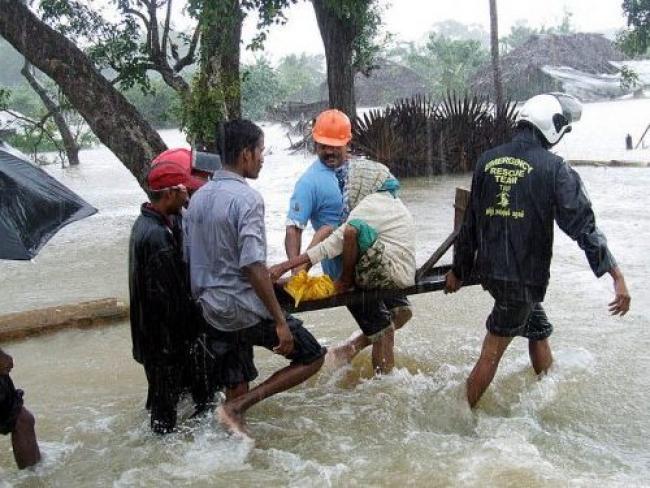Articles Menu

Mar. 1, 2022
Despite efforts by the Biden administration in the United States to strike loss and damage language from this week’s climate impacts and adaptation report, the Intergovernmental Panel on Climate Change (IPCC) is standing by its finding that the world’s poorest and most marginalized are unfairly paying the highest price for human-driven climate change.
“Climate change encompasses unevenly distributed impacts on women, youth, elderly, Indigenous Peoples, communities of colour, urban poor, and socially excluded groups,” writes the world’s top climate research body. The report cites “robust evidence” that these vulnerable people live in countries that face multiple development challenges at once, where “high levels of poverty interact with limited access to water and sanitation or with high levels of forced migration and in some cases with state fragility making solutions difficult.”
These current development challenges are often caused by long and complex histories, the report adds, “including issues of colonization and marginalization.”
A failure to consider historical processes like colonialism when implementing climate responses can lead to “maladaptive outcomes,” the IPCC warns.
Those outcomes emerge “when impacts of climate change impacts and risks are disproportionately borne by the poorest populations,” the report says. “Literature shows that adaptation practices can indeed redistribute vulnerabilities and increase risks to already poor and marginalized people with risk to maladaptation outcomes mainly in the Global South countries.”
The IPCC explains that maladaptive actions are those that have unintended consequences by increasing greenhouse gas (GHG) emissions, increasing vulnerability to climate change with “diminished welfare,” of both. It’s more likely to happen when climate adaptation efforts are not equitable at the policy level and put vulnerable populations at higher risk “by excluding them from benefits and support,” while “attending to the needs of people of the most enfranchised segments of society.”
For instance, a study found that adaptation to flooding in Jakarta privileged political economic elites connected to the Suharto regime, while weak infrastructure worsened the loss of assets, housing, and displacement in the poorest neighbourhoods.
That kind of experience shows that it’s not enough to reduce people’s exposure to climate hazards, writes the IPCC: responses must be holistic, and should consider the root causes of vulnerability along with the physical climate event. Planning must become more integrated and coordinated, with emphasis on social and climate justice, the IPCC advises.
The report lists East, Central, and West Africa, South Asia, Micronesia and Melanesia, and Central America as regions most severely affected by climate change, with increased vulnerability from high levels of poverty and lack of basic government services.
Governance failures heighten vulnerability through poor services, stagnant wages, and social threats like ethnic or religious discrimination, writes the IPCC. Developing countries overall are disproportionately affected by job loss, food insecurity, and poverty, but even within those countries, losses are unequally distributed. According to one study cited in the report, the poorest 40% of citizens across 92 developing countries suffered 70% greater income losses than those with average wealth.
Facing compounding crises on all fronts—environmental, economic, social, and political—many families in these regions migrate to more livable conditions, states the report. Evidence shows climate change “is accelerating livelihood transitions from rural agricultural production to urban wages,” intensifying the upheavals caused by industrialization, urbanization, and economic globalization.
It is also hindering efforts to alleviate poverty, says the IPCC, and at the same time, some climate responses are making poverty, inequality, and vulnerability worse. Shortsighted actions that alleviate an immediate problem offer no long-term solutions and can actually create new dependencies that perpetuate vulnerability “due to the reinforcement of inequalities and the effects of further marginalization,” the IPCC finds. The report also cites increasing evidence that responses to indirect climate impacts—like those on marine or terrestrial ecosystems—”affect different groups differently and impact poverty and livelihood security.”
These circumstances have heightened the urgency around efforts under the 2015 Paris Agreement to “avert, minimize, and address loss and damage associated with climate change impacts, including extreme weather events and slow onset events.”
The IPCC assessment notes that there is robust evidence of losses from both economic and non-economic impacts in the most vulnerable countries. The assessment could therefore have important implications for a global loss and damage discourse that is facing strong resistance from the wealthy nations that are largely responsible for the climate crisis, but refuse “to accept any liability or compensation claims for their historic responsibility in causing climate change,” reports Climate Home News.
An unnamed source told Climate Home that the United States tried to have the term “losses and damages” replaced with the word “impacts” in the final draft of this week’s IPCC report. That action was widely condemned by delegates from other countries.
“We made real progress at the COP 26 climate summit, getting loss and damage on the global agenda. However, it seems rich nations are trying to undermine this progress by attacking the reality of loss and damage through the IPCC process, led by countries which claim to be climate leaders, like the U.S.,” said Nushrat Chowdhury, Bangladesh-based climate justice advisor for Christian Aid.
“It is shameful to see them boasting about their climate achievements in public, yet behind closed doors they are doing everything they can to prevent support reaching the most vulnerable,” she added.
[Top photo: trokilinochchi/Wikimedia Commons]